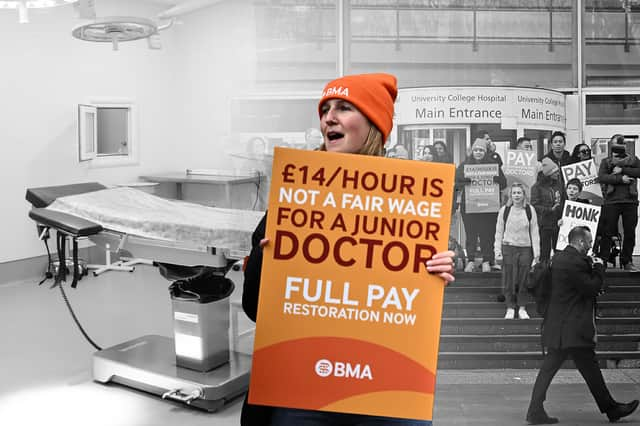Junior doctors’ strike: how NHS hospitals in England compared for cancelled operations and appointments


The impact of the four-day junior doctors’ strike on each hospital trust in England is laid bare by new NHS figures.
More than 195,000 operations and appointments had to be cancelled at acute trusts due to the unprecedented walkout by members of the British Medical Association (BMA) from 11 to 15 April. A further 4,000 appointments at mental health trusts and more than 500 community appointments also had to be called off.
Advertisement
Hide AdAdvertisement
Hide AdAt its peak, at least 27,361 staff were on strike - although some NHS trusts did not record data, so the number is likely to be higher. The number of cancellations eclipses the 175,000 called off during the previous, shorter, junior doctors’ strike in March, but is lower than the 285,000 cancellations the government had been anticipating.
This table shows the number of operations and appointments cancelled at each acute hospital trust in England:
NHS national medical director, Professor Sir Stephen Powis, said the figures laid bare the “colossal impact of industrial action on planned care in the NHS”.
He said: “Each of the 195,000 appointments postponed has an impact on the lives of individuals and their families and creates further pressure on services and on a tired workforce – and this is likely to be an underestimate of the impact as some areas provisionally avoided scheduling appointments for these strike days.”
Advertisement
Hide AdAdvertisement
Hide AdHe said NHS staff now face an “immense amount of work” to catch up on these appointments, while continuing to tackle the existing waiting list backlog.
He added: “We have now seen nearly half a million appointments rescheduled over the last five months, and with each strike, it becomes harder. While our staff are doing all they possibly can to manage the disruption, it is becoming increasingly difficult and the impact on patients and staff will unfortunately continue to worsen.”
In the Commons, health secretary Steve Barclay said he understood “there are significant pressures on junior doctors, both from the period of the pandemic and from dealing with the backlogs that that has caused”, but that BMA leaders had “still not indicated that they will move substantially from their 35% pay demand, which is not affordable”.
Dr Vivek Trivedi and Dr Robert Laurenson, of the BMA, said: “Junior doctors know all too well the frustration of patients waiting too long for care, and with a waiting list of 7.2 million in England, we are facing difficult conversations with them every single day.
Advertisement
Hide AdAdvertisement
Hide Ad“These millions of patients are not in this position because of strikes though. Persistent under-resourcing of the health service and under-valuing staff – exacerbated by a pandemic – mean we simply don’t have the workforce and capacity to provide the high-quality and timely care that patients need and deserve.
“This is why we have been led to strike, and while we are of course sorry to anyone who had their care disrupted, this is the same apology we’re already having to give to patients on a daily basis because the NHS cannot cope.”
The NHS Confederation, which represents managers, called on both sides to reach common ground on pay and settle the dispute.
Chief executive Matthew Taylor said: “This strike action is going on much longer than expected and will have long-term consequences for patients.”
Advertisement
Hide AdAdvertisement
Hide AdOf England’s acute trusts, Mid and South Essex NHS Foundation Trust saw the highest number of cancelled operations, at 727, followed by London’s Imperial College Healthcare NHS Trust at 672 and Norfolk and Norwich University Hospitals NHS Foundation Trust at 620.
Comment Guidelines
National World encourages reader discussion on our stories. User feedback, insights and back-and-forth exchanges add a rich layer of context to reporting. Please review our Community Guidelines before commenting.
